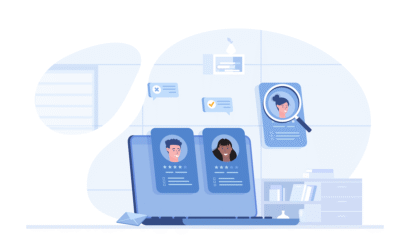Being Human during Online Communication
Technology has made it a difficult time to be a human during online communication – advances like artificial intelligence, machine learning, and bots have mitigated the need for organic beings to be involved in many aspects of the selling paradigm.
Fortunately for those of us who walk upright, humanity is still critically important – particularly given the importance of consultative selling as a means of resonating with buyers.
The good news? YOU remain your company’s single, most powerful, competitive advantage. This is the assertion at the heart of the book, “People Buy You: The Real Secret to What Matters Most in Business,” by Jeb Blount.
In the book, Blount disputes the notion that technology is a one-for-one substitute for solid interpersonal skills – and dispels several myths that proliferate in today’s selling landscape, including:
- Friends buy from friends: And, in particular, that business success is only possible through familiarity.
- People buy from people they like: Turning on the charm is no guarantee of success. It’s no longer about selling and convincing – instead, it’s about connecting and solving.
- You have to sell yourself: When we sell people on why they should like us, it backfires. However, when people choose to buy you for their reasons, it creates a powerful relationship.
To help people break through the clutter, Blount writes about five core principles that lie at the heart of his philosophy.
5 Skills to Maximize Your Online Effectiveness
Be Likable: It’s not about being friends – but it is about being acceptable. Making a great first impression is critical for effective online communication. If it is unnatural for you to smile and exude confidence, it will be hard to forge a genuine human connection. This includes behaviors like:
- Smiling – Doing this with sincerity can help humanize business relationships and convey authenticity
- Good manners – This is no time to be rude or impolite.
- Being there – Shut everything else out and remain completely focused on the person in front of you.
- Enthusiasm and confidence – This is infectious. Confidence, exuded in the right measure, provides others with a sense of security that you know how to solve their problems. Do this by investing in your mind, body, and spirit.
Authenticity – Don’t pretend to be someone you’re not. Insecurity is at the heart of a lack of authenticity. Work on your confidence to rise above the desire to be a phony
Connect: Bear in mind that, behind all of the corporate bluster and marketing speak, business is simply one person solving another person’s problems. To that end:
- Ask easy questions – Allow your buyer the opportunity to talk and demonstrate that you are listening.
- Listen, and listen deeply – Make eye contact, observe your buyer’s body language, and resist the temptation to think about what you want to say next.
- Keep them talking – Don’t kill your momentum by blurting out your next question. Develop the discipline to turn off your natural inclination to focus on your own thoughts and put aside your desire to talk to satisfy your own need to feel important. Talk to them – don’t interrogate them.
- Stay connected – Demonstrate that you are genuinely interested in them and their needs and that you value and appreciate them. Praise their accomplishments and remember the details about themselves that they’ve shared.
Remember and use names – The one word we respond to and long to hear above all others is our own name. It makes us feel valued and acknowledged. Failing to remember names hurts your likability and could be considered lazy.
Solve Problems: Avoid the “pump and dump.” Truly effective selling is all about asking the buyer the right sales probing questions and demonstrating that you can help them solve a problem or issue. Blount suggests being mindful of these five rules of questioning:
- People won’t tell you their real problems until they feel connected to you.
- Get them to do the talking, so they will feel comfortable. Once they open up, they will reveal more about their problems.
- Communicate with stories that can reveal clues about their challenges.
- Be empathetic and follow emotional cues to problems. The key to uncovering and solving problems is questioning and listening deeply. This requires intellect and empathy.
- Never make assumptions.
Build Trust: Provide consistent evidence that you are on their side. Trust, after all, is the foundation on which all relationships are built. When your customers rely on you to deliver on promises, they are putting themselves in a vulnerable position with their money and time. Blount said that to truly build trust over time, it takes making regular deposits in a person’s “emotional bank account. Other ways to demonstrate your devotion
- Go the extra mile
- Sweat the small stuff – Things like showing up late for a meeting, not returning calls or emails, disorganization, grammatical errors, failure to follow-up, etc. seem small, but they add up over time and hurt trust.
- Listen.
- Admit when you are wrong and apologize and do it quickly.
Create Positive Emotional Experiences: These are the touchpoints that only we humans can really pull off. This involves taking action to do something kind for another person, for the sole purpose of making them feel good. It also allows you to take advantage of the “Law of Reciprocity” – that the goodwill will be returned (hopefully, in the form of a sale!). When you consistently create joy, you build emotional anchors, which creates loyalty and repeat business. Example of successful touchpoints, says Blount, include:
- A phone call to recognize an accomplishment
- A handwritten thank-you note
- Birthday and anniversary cards
- A framed newspaper or magazine clipping about the client’s newsworthy achievement
- Unexpected gifts
- Concert tickets and VIP experiences
Though these five core principles may seem like a no-brainer to adhere to, it’s easy to forget to use them during every buyer interaction.
Can we help you add the human side to your sales interactions, and unlock the power of consultative selling? Our IMPACT Selling Virtual Instructor-Led Sales Training Program is the perfect solution. Our expert facilitators can train your team online from anywhere, in a live, collaborative, virtual classroom. Learn more about our Virtual Instructor-Led Training with our requesting one of our helpful information packets below.
Have a question? Submit it to The Brooks Group Help Desk and an expert will get back to you within 24 hours. [email protected]




